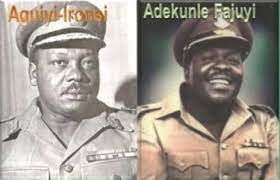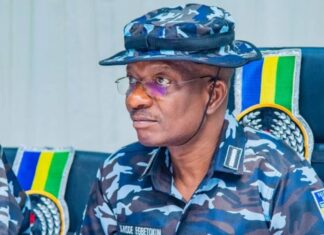By Emeka Alex Duru
Today, Thursday, July 29, makes it exactly 55 years that Nigeria lost two of its illustrious sons – General Johnson Thomas Umunnakwe Aguiyi-Ironsi and Colonel Francis Adekunle Fajuyi, in what has come to be regarded as a counter coup, masterminded by mainly northern army officers on July 29, 1966.
At the time of their death, the two held significant positions in the country’s military and political leadership. While Ironsi was the Head of State, Fajuyi was the Military Governor of the then Western Region.
Various accounts on the circumstances of their assassination have been rendered by those that carried out the acts and others that claim knowledge of what transpired.
What has however not been adequately captured is the volume of lessons, if any, that has been learnt from the supreme sacrifice that the two paid to keep the country one.
It is also not known the extent the successive administrations in the land have gone in giving the fallen heroes their due in terms of recognition and celebration. It is however certain that if any effort had been made in showing respect to the ideals they pursued and lost their life for, that would have been largely marginal or negligible.
By the time Ironsi and Fajuyi were felled, they had the option of playing the role of Nero, the Roman Emperor who fiddled while the empire was on fire. By their ranks and positions, they could be said to be comfortable. Both were also, not in any way, fingered in the earlier January coup that witnessed heavy casualties among politicians and military officers of Northern and Western extractions.
They were merely called upon to intervene to steady the ship of the Nigerian state that had clearly gone adrift. In the six months that they held their various duty posts, Ironsi and Fajuyi, for whatever anybody could hold against them, rose to the occasion in discharging their tasks.
Though there may have been mistakes in going about their briefs, these could have been essentially errors of judgement and not borne of bad faith. But in line with the confusion of the day, they were forced to spill their blood.
Bad as that was, particularly for their families and acquaintances, in a system that is desirous of nation building, that would have counted as national sacrifice. History is replete with great men and women who were martyred for noble causes. It is perhaps, in this instance that the saying – revolution is watered by the blood of men- finds relevance.
But 55 years after the two and other bright officers and civilians were wasted, the jury is still out on whether Nigeria has learnt any lessons from the exercise. Of course, it may be convenient to argue that at some levels, progress may have been recorded in material terms. The country can also be said to have attained structural advancement from its four-region setting to the current 36-state arrangement.
But at the heart of the matter is that side-by-side physical advancement of Nigeria, are the widening fault lines that have made nonsense of its size. Consequently, the factors of space and population which Nigeria could have leveraged on to explore and harness its innate potential, are turning out its nemeses.
From Ironsi’s unification decree which divided the country into 34 units – the major reason cited for his assassination – Nigeria has been split into 36 states, with many of the entities barely existing on monthly hand-out from the federal government.
Aguiyi-Ironsi could have carried on with the sordid situation he met on ground when the reins of power were thrown at him. If he had, perhaps, his assailants who, events later indicated were solely driven by sheer jealousy and callous vengeance, may not have had much reasons to move against him.
Fajuyi, also, could have played along. In a system that increasingly appears to reward perfidy in place of hard work and honesty, playing along could perhaps, have earned him protection and career progression. Given the circumstances of the day, he had the option of surrendering Ironsi, his guest, to the rampaging soldiers as bargaining chip to hold on to his job as governor. But he chose the path of loyalty and integrity.
Fajuyi died a hero, a true friend, great officer and patriot.
By surrendering himself as a sacrificial lamb, he perhaps, unknowingly narrowed an existing gap of suspicion between the South West and the South East. It is better to imagine the level of distrust the Yoruba-Igbo relations would have been further subjected to, if Fajuyi had not made the unusual sacrifice.
In a country that truly proclaims that the labour of its past heroes shall never be in vain, the template of brotherliness established by Ironsi and Fajuyi should have been adopted by the succeeding leadership and passed on to the younger generation. It is only in this regard that Nigeria would make a genuine start in forgetting its ugly past. It is also in this spirit, that the blood of these gentlemen and their compatriots lost in the subsequent civil war, would not have been wasted. But that, sadly, is not the case.













